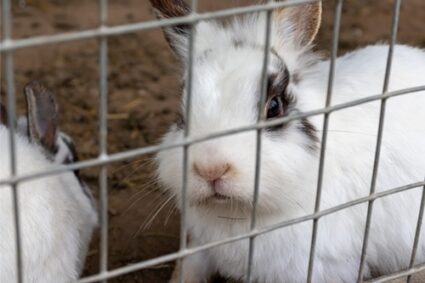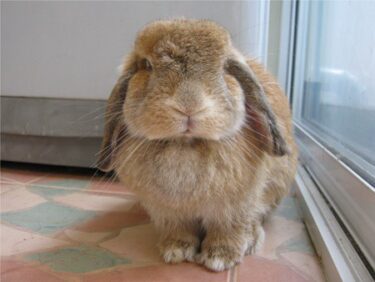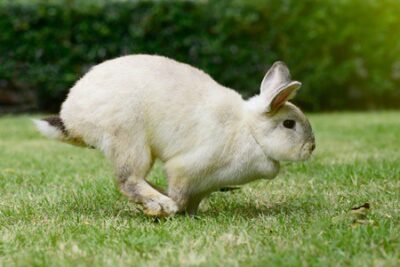Destructive behavior in rabbits can happen very suddenly. Types of bad behaviors include anything that rabbits do to themselves/each other or objects in your home, garden, or rabbit hutch.
Health problems, boredom, or a lack of enrichment commonly lead to destructive behaviors. This is most likely to happen if you have a lone rabbit, no toys, no wood to chew on, and no place to dig.
Negative behaviors can be controlled by offering enough stimulation, play, and chewing materials. Good behavior should be rewarded with treats, fun activities, and affection. If you haven’t spayed or neutered your rabbit, doing so may reduce aggressive behaviors, such as fur pulling.
What Are the Causes of Destructive Behaviors in Rabbit?
| Type | Cause |
|---|---|
| Destructive Chewing | – Boredom – Being territorial – Not spayed or neutered – Wanting attention – Not enough access to hay |
| Overeating | – Boredom – Lack of stimulation |
| Excessive grooming | – Boredom and lack of stimulation – Stress |
| Fur Pulling | – Pseudopregnancy and nesting if unspayed) – Boredom or stress |
Destructive Chewing
Rabbits love to chew things. However, it can become a problem when a rabbit’s chewing reaches the point where it causes significant damage to carpets, furniture, and household items.
Worse still, rabbits may chew on electrical cords and risk being electrocuted. Make sure wires are out of the way or covered by cable protectors. Rabbits are quite fond of chewing on rubber, so you’ll also want to keep your TV remotes away from your rabbit.
Hutch rabbits enjoy nibbling, chewing, and digging. Even if they don’t get the chance to do it as much, their need for stimulation can be greater than that of rabbits housed indoors. This can cause rabbits to destroy their own cage. Recognizing this early and giving your rabbits enough hay, toys to play with, and exercise can prevent them from causing severe damage to their hutch.
Rabbits are Highly Territorial
Rabbits like to have their own resting spots and access routes throughout your house. Therefore, it’s highly likely that these areas and routes will turn into easy targets for destruction. Anything that you leave lying on the floor will be inspected by your rabbit and chewed on.
Most indoor rabbits like to choose their own sleeping spots. This is often under a table or bed, or behind a sofa. Rabbits choose such locations because they resemble burrows (i.e. they have entrance and exit routes and a roof over their head).

Once they’ve chosen their resting spot, it’s sensible to provide a blanket or towel for your rabbit to lie on. This will ensure that your rabbit chews holes in the blanket, instead of the carpet, table legs, or sofa. Avoid blocking the entrance or exit routes of your rabbit’s resting spot. If your rabbit isn’t able to fit through these gaps easily, it will nibble on your furniture to widen the opening.
Rabbits also enjoy chewing on wooden furniture, such as table legs. Offering a more tempting diversion, such as a piece of apple or willow wood can prevent your rabbit from destroying your wooden furniture. If that doesn’t work, try covering the areas your rabbit likes to nibble on with a wooden tube, duct tape or cardboard.
Rabbits will dig at carpets and create holes in them. Protect areas your rabbit likes to dig with a piece of cardboard or a blanket. Your rabbit will likely dig or nibble at them instead.
Psychological Factors of Chewing
Sometimes, destructive chewing or digging behaviors can be linked to psychological factors, such as a rabbit’s sex, age, and personality.
Sex and Age
Female rabbits have a stronger urge to dig. This doesn’t mean male rabbits don’t exhibit signs of destructive chewing at all. Rabbits under 2 years of age should be spayed or neutered to avoid destructive and aggressive behaviors among each other and towards the objects around them.
If you’ve recently spayed or neutered your rabbit and your rabbit continues to chew destructively, wait a little longer. Rabbits under the age of 2 are packed with energy, so in such instances, it’s smarter to rabbit-proof your home. Your pet’s chewing is likely to reduce as it matures. However, if your rabbit is mature and has been spayed, it’s chewing may not be due to hormones.
Personality
If your rabbit insists on chewing on household objects, it may be trying to get your attention. Rabbits that enjoy chewing are often outgoing, intelligent, and affectionate. They crave attention.
If you aren’t able to offer your rabbit enough attention, consider other ways of relieving your pet’s boredom. Perhaps a companion may help alleviate your rabbit’s hunger for attention.
Overeating
Rabbits tend to turn towards food to cure their boredom. Therefore, if you leave food out for your rabbit, it will likely eat it if it has nothing to do. This can lead to weight gain, especially if the food your rabbit is eating is dry pellets, vegetables, or fruits.
Fortunately, rabbits cannot overeat hay. In fact, they should be given ample amounts of hay to keep their nutrition and teeth in check.
If you do feed your rabbit pellets, opt for one made up of mostly Timothy grass meal. Most high-quality pellets will contain only 14% protein, with no animal fat. Being herbivores, rabbits can enjoy healthy lifestyles when given enough hay along with vegetables in moderation.
Excessive Grooming
Rabbits are keen groomers and are often seen grooming themselves several times a day. Furthermore, the hair they collect from grooming usually doesn’t cause them any harm.
However, if your rabbit grooms itself excessively as a result of being bored, it can cause a hairball problem that can affect the rabbit’s digestive tract. Offer your pet more hay as it will relieve your rabbit’s boredom while providing it with enough roughage to maintain a healthy gut.
Fur Pulling
According to research published in the Journal of the American Association for Laboratory Animals, fur pulling may be seen in unspayed female rabbits going through phantom pregnancies.
Also known as pseudopregnancy or false pregnancy, phantom pregnancy can occur in many female rabbits, even if they are kept singly. It typically lasts for 16 to 17 days and may involve nesting and hair-pulling behavior.
Hair pulling during nesting isn’t necessarily harmful to your pet. However, it can also be a symptom of boredom or stress. Therefore, if your female rabbit hasn’t been spayed, spay it. Providing her with ample enrichment, toys, and playtime can also help relieve her boredom and stress.
How to Stop Destructive Behavior in Rabbits
As serious as they may look, most destructive behaviors in rabbits can be easily solved. The following are some tips to keep your rabbit from destroying its hutch and your home.
Offer Plenty of Hay
Rabbits don’t just nibble on things because they love to, but also because they need to chew. A rabbit’s teeth are continually growing. Therefore, if it stops chewing, it can suffer from overgrown teeth, which can cause serious injury to the mouth and jaws.
Overgrown teeth are a major medical problem in rabbits that can cause intense pain. Therefore, if your rabbit chews too much, it is just doing something that comes naturally.
The number one cause of destructive chewing (or chewing that destroys your furniture) is not having access to enough hay. Your rabbit should have access to its weight of hay every day. This may seem like a lot of hay, but your rabbit’s diet should be made up of at least 70% to 80% high-quality hay. Pellets, vegetables, and fruit should always be offered in moderation or as treats.
If your rabbit refuses to chew on a particular type of hay, try offering it a different variety. Most experts recommend Timothy hay for rabbits. Trying the same variety from different companies may help as well as some rabbits can be picky about their hay.
You can also control your rabbit’s chewing behavior by placing toys in its hutch or living area. This doesn’t have to cost money. You can also use hay to create toys, which can be more stimulating for your pet than having piles of hay lying around in your rabbit’s hutch.
Alleviate Boredom
Some rabbits chew excessively because they are bored. Your rabbit may nibble on objects in its reach, or eat excess amounts of pellets or vegetables. The latter can cause weight gain, which is why hay is a much better option if you’re looking for something your rabbit can constantly chew on.
Providing a more enriching environment will prevent issues associated with chewing. Your rabbit will be too distracted with the fun things it can do.
Creating a stimulating environment for a rabbit is simple and often free. You can use the supplies you already have in your home, such as heat-sealed boxes without tape (cereal, pasta, or soda boxes). Stuff your box with shredded newspaper or hay with enough room to allow your rabbit to pull pieces out of the box.
Adding a few treats into the cardboard board stuffing can make your homemade toy even more enjoyable. Your rabbit will likely rip the box apart in an attempt to find its treat. Empty paper towel rolls also make fun toys for rabbits. Stuff the roll with hay and watch your rabbit go crazy.
Try including plenty of toys in areas your rabbit spends most of its time in. Some excellent options are soft cotton towels, old stuffed animals, and larger boxes with holes cut on either side so that your rabbit can run in and out of them.
However, with any item that isn’t made with hay or paper, you want to make sure your rabbit doesn’t ingest the fibers while it plays. Avoid using old towels or towels with loose strings as your rabbit can easily ingest them and suffer from digestive health issues.
Spaying or Neutering Your Rabbit
Excessive chewing can sometimes be a hormonal issue. Any rabbit that is around 6 months (check with your vet first) should be spayed or neutered to prevent aggressive or destructive behaviors.
Furthermore, most unspayed female rabbits can get ovarian cancer before they reach the age of 5 if they haven’t been spayed. Your rabbits will also show significant improvements in their temperament after being spayed or neutered.
If your rabbit is recently spayed or neutered and you still see signs of destructive chewing, give your pet a little time. Most rabbits grow out of their excessive chewing habits. Like kittens or puppies, young rabbits have a lot of energy, which often reduces as they mature.
Spend More Time Outside
As long as the weather is not too hot and your yard is rabbit-safe, your rabbit can play outside under your supervision. Allowing a rabbit to hop around and play outside is an excellent way to keep it mentally stimulated.
When a rabbit is outside, it can chew and dig all it wants. As soon as it comes inside, your rabbit will be more interested in eating and napping than chewing.
Keep in mind that rabbits cannot tolerate high temperatures. Talk to your vet about what temperature range is suitable for your rabbit breed.
According to Michigan State University, rabbits have an internal temperature of 102 to 103 degrees Fahrenheit. For most rabbit breeds, temperatures over 80 degrees Fahrenheit are too hot and can lead to overheating, which can be hard to treat. The risk of overheating in the summer is higher for longer-haired breeds.
Unless you have a lot of shade outside and it is sufficiently cool under the shade, you don’t want to take your rabbit outside in the heat of the summer. A temperature gun can help you estimate how hot it is in sunny and shaded areas of your yard.

When playing outside, you’ll also want to ensure there are enough areas where your rabbit can hide and feel safe. Something as simple as a sheet over a cage with the door open or a large box with a hole cut out can make fun hiding spots for your rabbit.
The fence in your yard should also be secure so that your rabbit cannot dig under it. The fence should be buried 6 inches to a foot so that if your rabbit does dig, it cannot escape.
Fences should also keep away predators, or animals that resemble predators, such as neighborhood cats and dogs. This will help prevent unwanted stress during your rabbit’s playtime.
If you don’t have a fenced yard, you can also place your rabbit in a gated area outside or a playpen in a nearby park. Just be sure that your rabbit is always under your supervision, whether it’s in your yard or a pop-up playpen in the park.
Rabbit-Proof Your Home
Chewing doesn’t always mean that your rabbit is doing something wrong. Owners should make sure that their home is rabbit-proofed before bringing a rabbit inside. Do the following:
- Cover all electrical cords with duct tape, plastic tubing, or cable covers. If possible, hide them away and keep them out of your rabbit’s reach.
- Protect wooden table legs by covering them with cardboard.
- Cover areas of your carpet your rabbit likes to dig and chew at with towels or cardboard.
- Use a baby gate or playpen to give your rabbit freedom to roam without allowing access to items it cannot chew on (such as cords).
- Keep chewable items, such as magazines, books, and baskets out of reach.
- Use products such as Bitter Apple to deter rabbits from items it likes to chew on. Note that this doesn’t work with all rabbits.
- Offer alternative chewing and digging areas near furniture your rabbit likes to chew on.
- If you’re redecorating, do not purchase wicker furniture. Rabbits love chewing on wicker, and you can’t blame them for it.
Should I Discipline My Rabbit?
Negative reinforcement, such as yelling “NO” or clapping your hands loudly to stop your rabbit from chewing, may be your first instinct.
However, rabbits do not respond to such training methods in the long-term. Chances are your rabbit will not associate your scary behavior with its chewing. Instead, it will only learn to be scared of you, affecting your bond with your pet.
Use Positive Reinforcement
Positive reinforcement can be much more effective. Offer your rabbit rewards, such as hugs and treats, when it is chewing on things it is allowed to chew.
Simple commands, such as “HOLD” can also help your rabbit understand when it should stop what it is doing. You want to make sure you use positive reinforcement so that your rabbit listens to your commands, instead of becoming scared. When training, have a patient and a positive mindset.
Learn more about disciplining a rabbit from our How to Discipline a Rabbit article.


Hello, thank you for your interesting article. I found it very helpful. I recently adopted two Rex rabbits. One female, one male. I had them spayed and neutered 2 weeks ago, and they are kept indoors in an Xpen. They are now more active and less gentle and sweet than they were before their spay/neuter! They are chewing on everything, make a huge mess in their X-pen constantly, and chew on the bars trying escape all the time. Is this just a phase of hormones that should pass soon? I liked their personalities much better before their operation! Any tips or suggestions on how to navigate this change? (FYI: They are in the same room where i have my office, and it is a large 10×14 foot space. I cannot let them free roam the house as my husband, kids, and dog will not allow it)